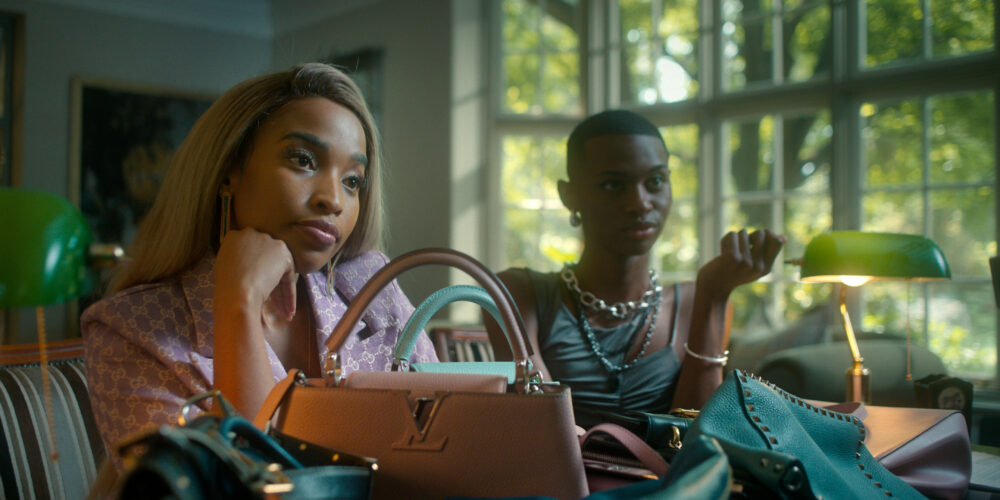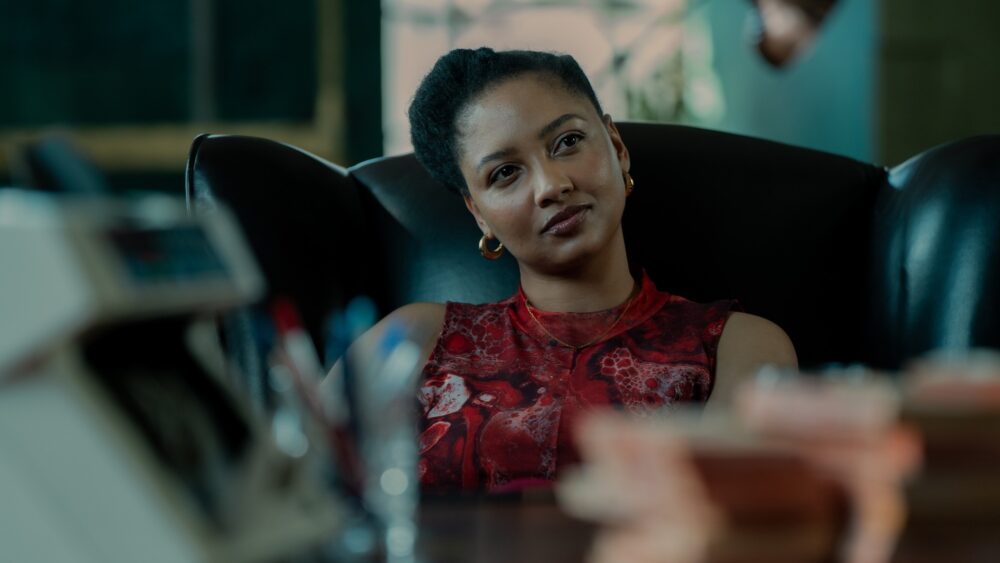Authentic: Bad Influencer creator Kudi Maradzika. Photo: Andre Berry
When Senyaka and Kamazu of Hunger Boyz released Fong Kong in 1998, it reflected a moment when counterfeit goods — mostly from China — were flooding South African cities and townships.
Since then, local underground syndicates have mastered the art of reengineering and replicating everything from fashion to food, including high-end brands.
Inside these cramped, sweatshop-like spaces, the influencer industry finds itself an accomplice. Online personas peddle fake glamour, scamming followers in pursuit of a quick payday — and survival.
This multibillion phenomenon is elegantly explored in the Netflix series Bad Influencer, premiering on 31 October.
Blending gripping crime drama with sharp, witty social commentary, the seven-part series balances high-stakes survival with the glossy illusions of influencer culture.
It follows small-time con artist and street-smart single mom BK, who must provide for her special-needs son. She teams up with wannabe influencer Pinky to sell fake luxury handbags online.
Their scheme draws the attention of notorious criminals in a counterfeiting syndicate, as well as law enforcement. Caught between criminals and cops, BK and Pinky must outfox both to stay out of jail, survive and thrive.
The series’s creator, writer and executive producer Kudi Maradzika says Bad Influencer is as real as it gets. Her background in journalism and media production has sharpened her eye to see potential narratives and story inspiration everywhere. This skills set has played a vital role in dishing out a realistic treat for local and global audiences.
“The inspiration came from my brief experience as an influencer a few years ago.
“The development process took about 18 months and filming spanned roughly two to three months. From writing to production, the goal was to make something fresh.” Maradzika tells the Mail & Guardian.
After pitching the idea for the series at the Realness x Netflix Episodic Lab in 2021, Maradzika and project partners at Gambit Films began sharpening the final story.
“During development, we consulted experts, from luxury bag specialists and influencers to child clinical psychologists, to ensure authenticity. I also did visit some market areas around underground Joburg, so the writing draws from both direct experience and additional research,” Maradzika says.
Bad Influencer hosts a powerhouse ensemble cast, including Thapelo Mokoena, Hamilton Dlamini, Emmanuel Castis and Tina Jaxa. Former Miss Universe Zozibini Tunzi also makes her debut in her first major acting role.
There are cameo appearances by Relebogile Mabotja and from some of South Africa’s top influencers, including Mihlali Ndamase and Sarah Langa.
The casting process, Maradzika says, was extensive.
“We saw between 15 and 20 actors for each role. We also did chemistry tests and when the final ensemble came together, it just clicked. They brought incredible energy and elevated the material far beyond what was on the page.”
Award-worthy performances came from Jo-Anne Reyneke, who plays BK, and Cindy Mahlangu, who portrays Pinky. An unlikely pair, drawn together by calamitous circumstances, their great screen chemistry certainly ate and slayed.
Both broken in their own ways, BK and Pinky form a contagious partnership that thrives on ambition and risk — at times with comedic results. Together, they descend into Joburg’s counterfeit economy, selling fake luxury handbags, eventually being forced to walk the knife-edge between heart and hustle.
There is, however, a growing concern about how woman-led Netflix shows, such as Unseen, Marked and Savage Beauty, portray their protagonists — often as desperate, cornered by circumstance and driven to crime. This risks painting an unbalanced picture of South African women.
Maradzika settles my concerns with her pointed interest in stories about underdogs. Beside the laughter, tears and cheer, BK and Pinky’s characters highlight issues of single parenting, estranged mothers and the empowerment of women.
“It was important for me to centre a single mother doing her best to provide for her child, to say her struggle matters, that her voice deserves space. The theme of female empowerment runs throughout and I wanted it to resonate, especially with young women in South Africa,” Maradzika affirms.
 Fake it till you make it: Cindy Mahlangu plays Pinky, a rising influencer, and Kamohelo Pule as Lelz, in the Netflix series Bad Influencer. Photo: Netflix
Fake it till you make it: Cindy Mahlangu plays Pinky, a rising influencer, and Kamohelo Pule as Lelz, in the Netflix series Bad Influencer. Photo: Netflix
Tone and City of Gold
Netflix’s local productions have done an impressive job of portraying multiple sides of Johannesburg — even amid the flood of films, series and music videos set in this vibrant “City of Gold”.
Through the direction of Keitumetse Qhali and Ari Kruger, Bad Influencer takes viewers from luxurious Sandton to underground inner Jozi, with drone-controlled cameras roving city skylines and urban landscapes.
The inclusion of tracks like 340ml’s Midnight and Skwatta Kamp’s Umoya adds authenticity and nostalgia, grounding the stories in South African urban culture.
Filming in and around central Joburg, Maradzika says, was an incredible experience.
“The city has such visual depth; we wanted to capture that energy in a way audiences hadn’t seen before.
“My favourite memory was shooting a nighttime stunt sequence.
“I won’t spoil it, but you’ll know it when you see it,” she says, teasingly.
The biggest challenge, however, Maradzika adds was translating the world on paper into something as rich and layered on screen.
“That’s the beauty of production, right, but partnering with Gambit Films made all the difference.
“They have incredible execution experience from shows like Unseen and Blood & Water and we worked together to bring the young, vibrant tone of the story world to life.”
 Dual worlds: Jo-Anne Reyneke gives a stunning performance as BK, a street-smart single mom and counterfeiter. Photo: Netflix
Dual worlds: Jo-Anne Reyneke gives a stunning performance as BK, a street-smart single mom and counterfeiter. Photo: Netflix
Heart and hustle
Though collaborating with Gambit, in principle, Bad Influencer was developed by Lincoln Green Media, an award-winning company founded by Maradzika. It is thus expected, when you put your ear close to the ground, to hear Maradzika is a hustler of note. She is a visionary screenwriter, director, producer and performer.
Some of her accolades include an Africa Movie Academy Award nomination for Best Actress for Tanyaradzwa in 2006; an Africa Magic Viewers’ Choice Award; a South African Film and Television Award; Promax Global Awards (gold and silver); multiple Loerie nominations and an International Emmy nomination as part of a production team.
Her feature Njuzu was selected for Durban FilmMart Access in 2023 and advanced in consideration for the 2022 Sundance Screenwriters Lab. Her second feature, Death and Its Friends, was selected for the Locarno Open Doors Lab this year. She was also awarded the Forty Under 40 Africa Award for innovation in storytelling.
Regarding how streaming platforms like Netflix influence South Africa’s film and TV industry, Maradzika says it evens the odds for new storytellers.
“Think about it — I am a Zimbabwean-born woman and the odds of my concept being selected for the Realness x Netflix Episodic Lab out of 400 applicants were incredibly slim. Yet, with the support of the Netflix content team, Bad Influencer found its way onto a platform with over 300 million subscribers.
“That’s the power of streaming; it amplifies stories that matter,” she adds, smiling.
With Bad Influencer, Maradzika essentially raises pressing questions about ambition, morality and the relentless pursuit of wealth to “secure the bag” — literally.
The seven-part series highlights how fame and fraud reshape women’s lives in the ruthless urban jungle of Joburg — yet they have the ability to rebuild and restore.
The broader black-market economy is not limited to counterfeit fashion and luxury goods but extends to fake pharmaceuticals, cosmetics and household goods, as seen in recent spaza shop crackdowns.
Estimated to be worth R3.5 billion annually, counterfeit trade in South Africa is bleeding billions from the national economy.
Specifically, the black-market value chain, as shown in the series, spans everything from sourcing fabrics and components to online sale platforms like Instagram and TikTok.
From high-rolling influencers to social media users chasing likes for external validation, the city’s digital and real-life hustles intertwine.
Bad Influencer is somewhat of an exposé of influencer and slay queen lifestyles, revealing how some resort to shady dealings in the pursuit of fame and fortune
With a strong cast, well-researched script and timely topics, Maradzika, Lincoln Green Media and Gambit Films give viewers not only indulgence, but a mirror held up to the complex hustle of modern Johannesburg — a city where survival often blurs the line between ambition and deception.